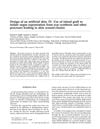 26 citations,
December 2021 in “Regenerative Biomaterials”
26 citations,
December 2021 in “Regenerative Biomaterials” The hydrogel speeds up skin wound healing and helps regenerate tissue.
 26 citations,
June 2020 in “Polymers”
26 citations,
June 2020 in “Polymers” Microneedle made of iron oxide and PVA helps hair regrowth in alopecia treatment.
 26 citations,
February 2020 in “International Journal of Biological Macromolecules”
26 citations,
February 2020 in “International Journal of Biological Macromolecules” Chitosan-coated dutasteride nanocapsules improve hair treatment, and physical stimulation boosts effectiveness.
 26 citations,
June 2011 in “International Journal of Pharmaceutics”
26 citations,
June 2011 in “International Journal of Pharmaceutics” SLN suspensions work as well as commercial solutions for minoxidil delivery, but are non-corrosive, making them a promising alternative.
 24 citations,
April 2007 in “European Journal of Pharmaceutics and Biopharmaceutics”
24 citations,
April 2007 in “European Journal of Pharmaceutics and Biopharmaceutics” Microparticles containing artocarpin extract could effectively treat hair loss and acne with minimal side effects.
 13 citations,
February 2018 in “Bio-medical Materials and Engineering”
13 citations,
February 2018 in “Bio-medical Materials and Engineering” Minoxidil inside tiny particles can deliver more drug to hair follicles, potentially improving treatment for hair loss.
 13 citations,
March 1998 in “Journal of Biomedical Materials Research”
13 citations,
March 1998 in “Journal of Biomedical Materials Research” Island grafts can help study skin regeneration separately from other healing processes.
 12 citations,
September 2010 in “Clothing and Textiles Research Journal”
12 citations,
September 2010 in “Clothing and Textiles Research Journal” Poplar seed hair fibers could be an eco-friendly insulation for textiles.
 8 citations,
January 2021 in “Smart materials in medicine”
8 citations,
January 2021 in “Smart materials in medicine” The new hydrogel is good for wound dressing because it absorbs water quickly, has high porosity, can release drugs, fights bacteria, and helps wounds heal with less scarring.
 6 citations,
March 2021 in “International Journal of Pharmaceutics”
6 citations,
March 2021 in “International Journal of Pharmaceutics” Optimal long-acting finasteride injection dose found: 16.8 mg, effective for one month.
 2 citations,
August 2011 in “InTech eBooks”
2 citations,
August 2011 in “InTech eBooks” New methods for growing skin cells can improve skin grafts by building blood vessels within them.
 2 citations,
April 2009 in “Bulletin of Experimental Biology and Medicine”
2 citations,
April 2009 in “Bulletin of Experimental Biology and Medicine” Flamena, a liposomal mix, helps skin heal better after a chemical burn.
 1 citations,
January 2016 in “Elsevier eBooks”
1 citations,
January 2016 in “Elsevier eBooks” The document concludes that a complete skin restoration biomaterial does not yet exist, and more clinical trials are needed to ensure these therapies are safe and effective.
 1 citations,
December 2010 in “Elsevier eBooks”
1 citations,
December 2010 in “Elsevier eBooks” Cell transplantation faces challenges in genitourinary reconstruction, but alternative tissue sources and microencapsulation show promise.
 June 2023 in “Livestock studies”
June 2023 in “Livestock studies” The article concludes that understanding the molecular processes in hair follicle development can improve the quality of fibers like Angora and cashmere.
 December 2022 in “Deleted Journal”
December 2022 in “Deleted Journal” Sheep wool keratin solution safely and effectively promotes hair growth.
 March 2021 in “International journal for research in applied science and engineering technology”
March 2021 in “International journal for research in applied science and engineering technology” Herbal hair dyes from tannin-rich plants are effective and safer than synthetic dyes.
 October 2007 in “Journal of Investigative Dermatology”
October 2007 in “Journal of Investigative Dermatology” The document suggests a bacteria plays a significant role in acne rosacea and that white hair can regain color after transplant, meriting more research on reversing grey hair.
 January 2005 in “Nihon Yasei Doubutsu Igakkaishi/Japanese journal of zoo and wildlife medicine”
January 2005 in “Nihon Yasei Doubutsu Igakkaishi/Japanese journal of zoo and wildlife medicine” Aloe vera gel effectively treated mange in camels.
 1160 citations,
November 2018 in “Physiological Reviews”
1160 citations,
November 2018 in “Physiological Reviews” The document concludes that better targeted treatments are needed for wound healing, and single-cell technologies may improve cell-based therapies.
 434 citations,
October 2003 in “PTR. Phytotherapy research/Phytotherapy research”
434 citations,
October 2003 in “PTR. Phytotherapy research/Phytotherapy research” Natural products in cosmetics are beneficial for skin and hair care with low toxicity.
 421 citations,
January 2015 in “Chemical Society Reviews”
421 citations,
January 2015 in “Chemical Society Reviews” Improving artificial vascular grafts requires better materials and surface designs to reduce blood clotting and support blood vessel cell growth.
 355 citations,
August 2013 in “Acta Biomaterialia”
355 citations,
August 2013 in “Acta Biomaterialia” The nanofibers with two growth factors improved wound healing by supporting structure, preventing infection, and aiding tissue growth.
 310 citations,
November 2011 in “Environment International”
310 citations,
November 2011 in “Environment International” Anticancer drugs are increasingly found in surface waters, and their long-term environmental effects are not well understood, requiring better testing methods.
 262 citations,
May 2017 in “Nanomedicine”
262 citations,
May 2017 in “Nanomedicine” New nanofiber technology improves wound healing by supporting cell growth and delivering treatments directly to the wound.
 260 citations,
January 2019 in “Pharmaceutics”
260 citations,
January 2019 in “Pharmaceutics” Niosomes are a promising, stable, and cost-effective drug delivery system with potential for improved targeting and safety.
 232 citations,
October 2015 in “International journal of molecular sciences”
232 citations,
October 2015 in “International journal of molecular sciences” Stem cells are crucial for skin repair and new treatments for chronic wounds.
 211 citations,
February 2009 in “European journal of pharmaceutics and biopharmaceutics”
211 citations,
February 2009 in “European journal of pharmaceutics and biopharmaceutics” Hair follicles help absorb and store topical compounds, aiding targeted drug delivery.
 202 citations,
June 2005 in “Aaps Pharmscitech”
202 citations,
June 2005 in “Aaps Pharmscitech” Lecithin organogels could be good for applying drugs to the skin because they are stable, safe, and can improve drug absorption.
 151 citations,
November 2018 in “International Journal of Pharmaceutics”
151 citations,
November 2018 in “International Journal of Pharmaceutics” Nanoparticles improve drug delivery through the skin but more research is needed on their long-term effects and skin penetration challenges.






























